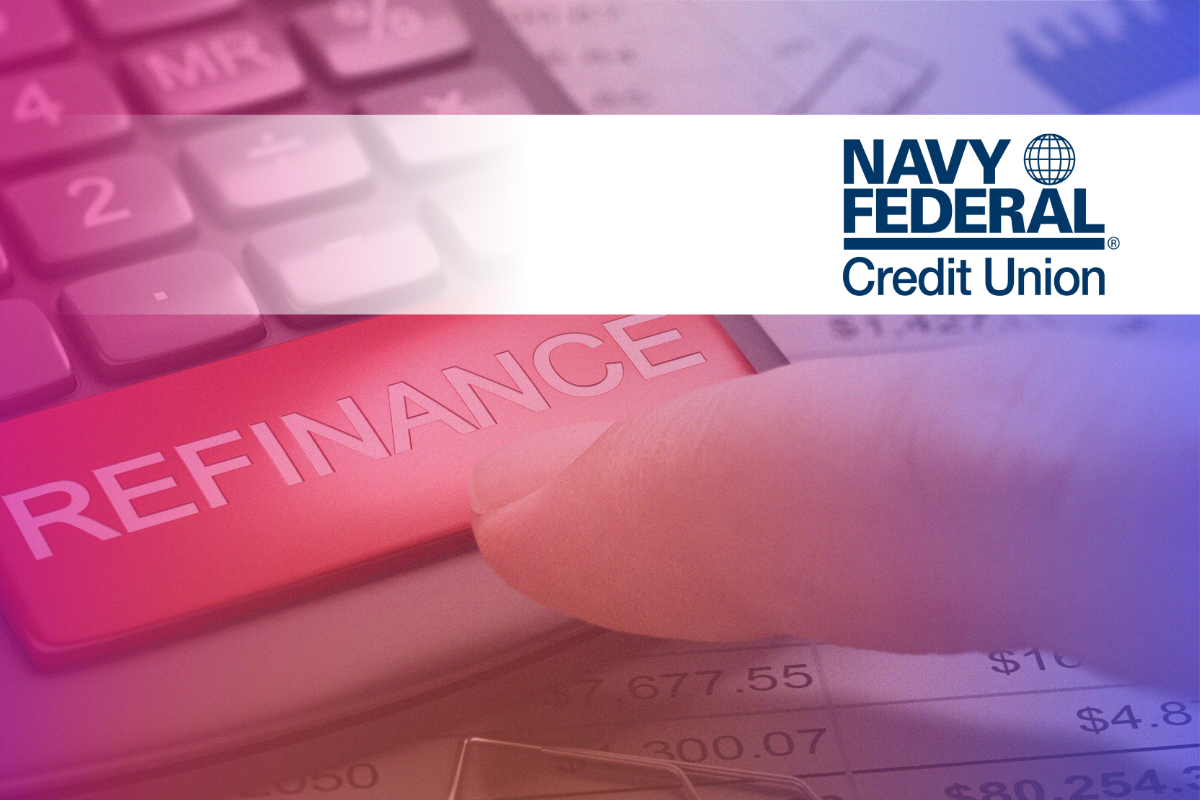Key Takeaways
- Navy Federal offers refinancing to military members, veterans, and their families.
- Borrowers enjoy low rates, flexible terms, and no application or prepayment fees.
- Co-signers can be released after 12 on-time payments, aiding borrower independence.
- Refinancing federal loans forfeits protections like IDR plans and loan forgiveness.
Navy Federal Credit Union is a Virginia-based credit union that offers a variety of financial services to its members, including student loan refinancing.
Navy Federal members usually include Department of Defense personnel, military service members—including active duty, reservists, veterans—and their family members.
Navy Federal Credit Union’s student loan refinancing program offers competitive rates and tailored solutions for its members. It’s especially known for its strong commitment to its members with military ties, making it a top choice among service personnel.
Today, we’ll explore everything you need to know about refinancing your loan with Navy Federal, from the benefits, eligibility, and requirements to the application process and potential drawbacks.
Overview of Navy Federal Student Loan Refinancing
As you may know, refinancing allows you to replace your existing student loans with a new loan, typically with a lower interest rate or more favorable terms.
The same goes for Navy Federal student loan refinancing, except here, the loan refinancing program is tailored to Navy Federal Credit Union members.
As a non-profit credit union, Navy Federal prioritizes its members’ needs by providing competitive rates and personalized financial solutions. Members also get to enjoy:
- Lower interest rates compared to their original loans
- Simplified repayment terms with a single monthly payment
- Access to exclusive member perks and financial education resources
Here’s a quick overview of what you can expect with Navy Federal’s student loan refinancing:
| Loan terms | 5, 10, and 15 years |
| Loan Limits | $7,500 – $125,000 (undergrad) / $175,000 (graduate) |
| Minimum Credit Score | No minimum (co-signer required below 690) |
| Minimum yearly income | $24,000 (At least $1,200 with an eligible co-signer) |
Navy Federal offers both fixed and variable rate loans, providing options to suit different financial goals. Fixed rates offer stability, while variable rates may provide initial savings but fluctuate over time.
Note: Refinancing your federal loans with Navy Federal, as with any private lender, means you’ll lose access to federal protections like Income-Driven Repayment Plans and loan forgiveness programs.
But if you have private loans or are confident you won’t need any federal benefits, refinancing with Navy Federal can be a smart financial move.
Why You Should Consider Refinancing With Navy Federal
Refinancing your student loans with Navy Federal comes with several advantages, particularly if you’re a member of this trusted credit union. Here are some of the key factors you should take into account:
- Lower Interest Rates: Navy Federal’s member-focused approach offers lower interest rates than many other private lenders in the student loan refinance market, saving you thousands over the life of your loan. Navy Federal offers both fixed and variable rate options giving you flexibility based on your financial goals.
- Flexible Repayment Terms: Navy Federal offers a variety of repayment options ranging from 5 to 15 years. Shorter terms allow you to pay off your loan faster and save on interest, while longer terms lower your monthly payments, freeing up your cash flow for other financial projects.
- Member-Exclusive Perks: As a credit union, Navy Federal provides additional benefits to its borrowers, including personalized financial advice, 24/7 customer support, and educational resources. These are especially helpful when navigating your loan management and repayment strategy.
- Co-signer Release Option: Navy Federal allows for co-signer release after meeting specific conditions, including:
- 12 consecutive on-time payments on your refinance loan
- No bankruptcies or foreclosures in the preceding 60 months
- No previous loan defaults with Navy Federal
- A healthy credit review and proof of income
- Military Family Support: Navy Federal has a strong reputation for serving military families and veterans. If you fall into this category, you will appreciate the institution’s understanding of your unique financial challenges and its commitment to supporting its members.
Given all these factors, Navy Federal looks like a great student loan refinance option. However, making any major financial decision requires a thorough assessment of your financial situation. Get a refinancing suitability analysis and ensure this is the best move for your financial future.
Eligibility Requirements for a Navy Federal Student Loan Refinance
Before you can refinance student loans with Navy Federal Credit Union, you must meet some specific requirements, including:
- Navy Federal Credit Union Membership: Navy Federal membership is available if you (or a family member/member of your household) are:
- An active member of the Army, Marine Corps, Navy, Airforce, Coast Guard, National Guard, or Space Force
- A veteran, retiree, or annuitant of any branch of the armed forces
- A DoD civilian employee or U.S. government employee assigned to a DoD installation, DoD contractor, or DoD civilian retiree or annuitant.
If you’re eligible based on the above criteria but not yet a member, you can apply for membership by providing proof of eligibility and opening a savings account with Navy Federal.
- Creditworthiness: Navy Federal generally requires borrowers to have a solid credit history to qualify for refinancing. A credit score of about 670 or higher will help you secure the best interest rates. If you have limited credit, you can apply with the support of a co-signer to qualify.
- Income and Debt-to-Income Ratio (DTI): You need a stable income to demonstrate your ability to repay your refinance loan. Navy Federal may also asses your DTI, which compares your total monthly debt payments to your gross monthly income. A lower DTI indicates financial stability, increasing your chances of approval.
- Loan Type and Amount: Navy Federal can refinance both private student loans and federal student loans. However, your loan must be in good standing and within the Navy Federal’s maximum ($175,000) and minimum ($7,500) refinancing amounts.
- U.S. Citizenship or Permanent Residency: You must be a U.S. citizen or permanent resident, in addition to the other requirements, to qualify for a Federal Navy refinance loan.
Navy Federal Interest Rates
When refinancing student loans with Navy Federal Credit Union, it’s crucial to understand the available interest rates and terms to determine whether this lender aligns with your financial goals.
Here’s a quick breakdown of the rates Navy Federal offers.
Navy Federal offers competitive fixed and variable rates. Fixed rates provide predictable monthly payments, while variable rates may adjust with market conditions. For the most accurate and up-to-date rate information, contact Navy Federal directly.
Note: The table shows annual percentage rates (APR) of fixed- and variable-rate loans. The lower rate in the rate range assumes a 0.25% reduction (subject to the floor rate) you will get when you sign up for automatic payments
The fixed rates will remain constant throughout the life of your loan, offering predictable monthly payments. As such, fixed-rate loans are ideal if you value stability and want to avoid fluctuations in your interest costs.
The variable rates, on the other hand, will fluctuate over time depending on market conditions. This means your payments might increase over time.
How to Apply for a Navy Federal Refinance Loan
Step 1: Confirm Your Eligibility
Ensure you are a member of Navy Federal Credit Union. If not, apply for membership by providing proof of eligibility (military affiliation or family connection) and opening an account.
Proceed to check your credit score to ensure you meet Navy Federal’s requirements, such as income stability and a favorable debt-to-income ratio.
Step 2: Gather Required Documentation
Prepare the necessary paperwork to streamline your application process. The most commonly required documents include:
- Identification (your driver’s license or passport)
- Proof of income (pay stubs or tax returns)
- Details of your current student loans (loan statement)
- Information about your co-signer if you’ve got one
Step 3: Apply Online or In Person
Visit Navy Federal’s website to begin your application. The process typically involves entering your personal details, providing information about your current loans, and selecting your preferred terms (rate type and loan duration).
You can also seek expert advice from Student Loan Professor to make sure refinancing is the right decision for you.
Step 4: Review Your Loan Offer
Once your application is processed, Navy Federal will provide a loan offer that includes your interest rate, monthly payment, and repayment term.
Review the terms to ensure they align with your financial goals. Then, compare the offer with your current loan terms and other refinancing options to confirm it’s the best fit.
Step 5: Accept the Loan and Pay Off Existing Debt
When you’re satisfied with the offer, you can formally accept the loan agreement to start your refinancing. Navy Federal will pay off your existing loans directly, consolidating them into one new loan under their program.
Step 6: Set Up Repayment
Establish your repayment plan, including autopay options for convenience and an added discount. Remember, Navy Federal offers a 0.25% interest deduction for setting up autopay. Take advantage of this option to reduce your total loan costs further.
Step 7: Monitor Your Loan and Stay on Track
Use Navy Federal’s online tools and resources to track your loan balance and payment history. Consider making extra payments when possible to reduce your loan balance faster and save on interest.
Pro Tip: Before refinancing, use a loan calculator to project your potential savings. Savvy Federal offers tools to help you visualize how different rates and terms impact your finances. Alternatively, you can get expert advice from Student Loan Professor to ensure refinancing is your best move.
Pros and Cons of Refinancing with Navy Federal
Whether refinancing with Navy Federal is right for you depends on your financial goals, current loan terms, and personal circumstances. Let’s consider the pros and cons to help you determine if this lender aligns with your needs.
The Pros
- Competitive Interest Rates: Navy Federal often offers lower rates than many other private lenders, especially if you’re a member with excellent credit.
- Flexible Repayment Terms: You can choose the terms that best suit your budget, whether you want to pay off your loan quickly or lower your monthly payments.
- No Hidden Fees: Navy Federal does not charge application, origination, or prepayment fees, allowing you to refinance your loan without extra costs.
- Co-Signer Release Option: if you initially needed a co-signer, you can release them after meeting specific conditions, such as consistent on-time payments.
- Member-Focused Perks: Navy Federal’s commitment to its members, particularly military families, means you can access exclusive resources and customer support.
The Cons
- Membership Requirements: You must be eligible for and join Navy Federal to access its refinancing program, which may exclude some borrowers.
- Loss of Federal Loan Benefits: Refinancing federal loans with Navy Federal means forfeiting federal protections like IDR plans, deferment, forbearance, and Public Service Loan Forgiveness.
- Strict Eligibility Criteria: If you have a limited credit history or a high debt-to-income ratio, you may struggle to qualify for a loan without a co-signer.
- Limited Loan Terms: While flexible, Navy Federal’s term options may not suit everyone’s needs, especially those looking for highly customized repayment schedules.
Frequently Asked Questions
How Long Do Navy Federal Student Loans Take?
Navy Federal states that you can complete the application in five minutes and then receive a preliminary decision. However, completing certification and receiving funds will take about four to six weeks.
Do Navy Federal Student Loans Qualify for Loan Forgiveness?
Navy Federal offers private student loans that do not qualify for federal protections, including loan forgiveness. As such, refinancing your federal student loan with Navy Federal will lose you access to all federal protections.
Supercharge Your Loan Management with SLP
Refinancing your student loan with Navy Federal can be a game changer. Its member-focused approach and competitive offering make it a top option if you qualify.
However, the decision to refinance is significant and requires careful evaluation. If you’re unsure whether Navy Federal is the right choice or need help exploring all your refinancing options, expert guidance can make all the difference.
Contact Student Loan Professor (SLP) for personalized advice to help you confidently navigate the student loan market. Our team will help you find and secure the best refinance deals to secure your future.
Brandon Barfield is the President and Co-Founder of Student Loan Professor, and is nationally known as student loan expert for graduate health professions. Since 2011, Brandon has given hundreds of loan repayment presentations for schools, hospitals, and medical conferences across the country. With his diverse background in financial aid, financial planning and student loan advisory, Brandon has a broad understanding of the intricacies surrounding student loans, loan repayment strategies, and how they should be considered when graduates make other financial decisions.





